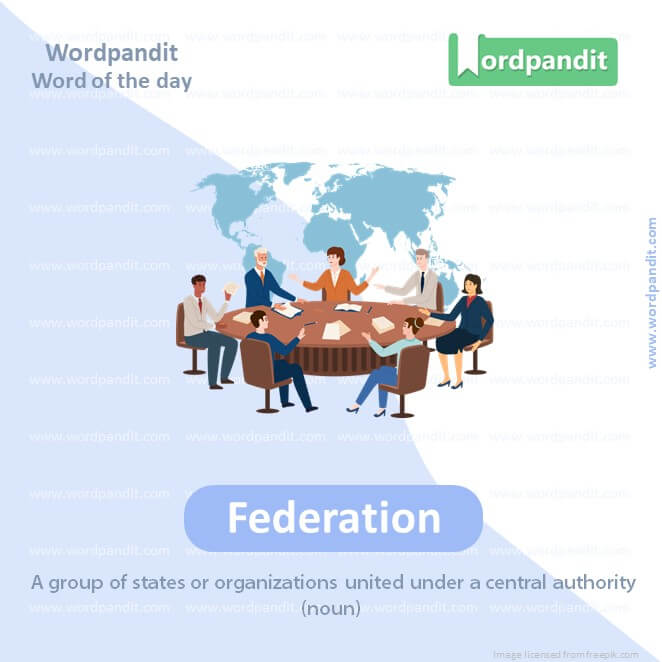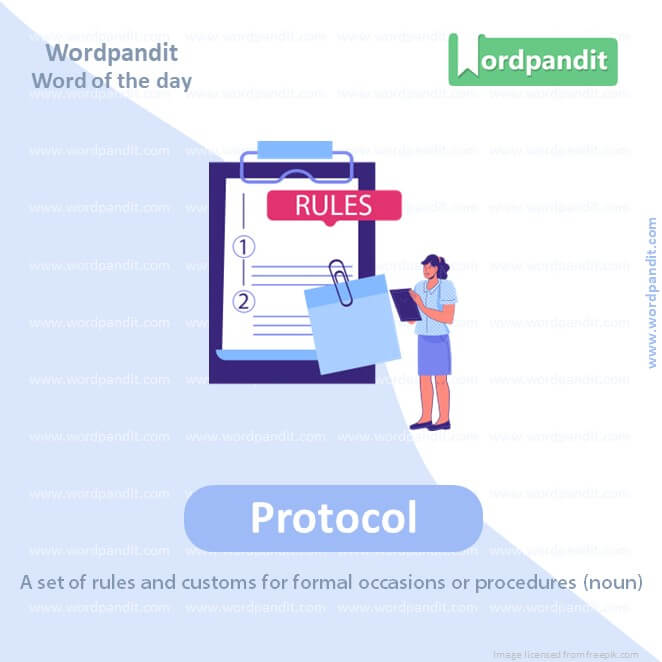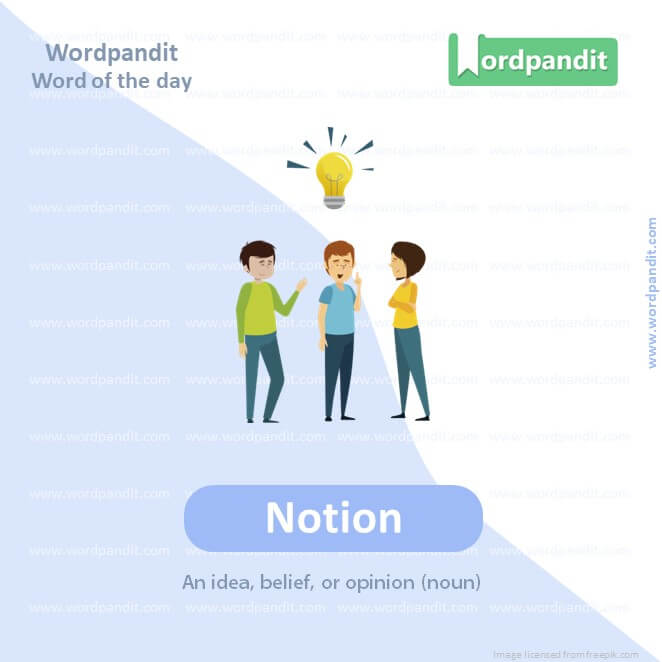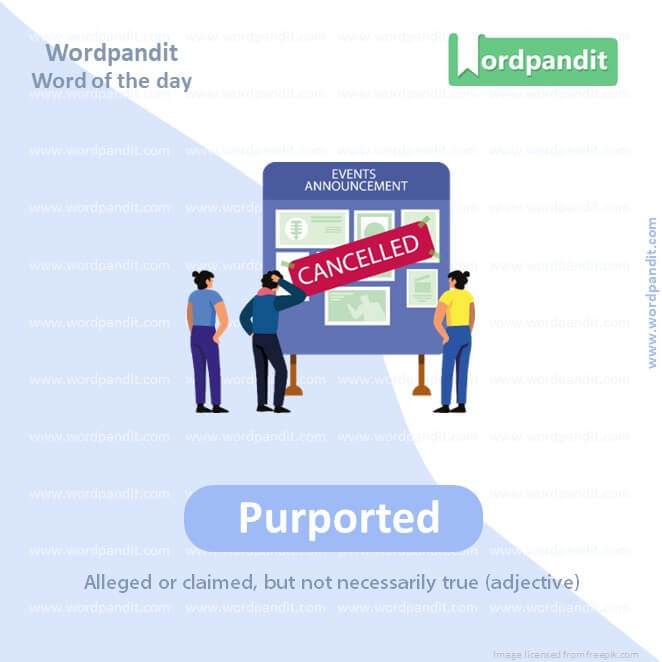Daily Vocabulary Words: List of Daily Used Words
Hi there. Welcome to this special section @ Wordpandit.
Our endeavour here is straightforward: highlighting important daily vocabulary words, you would encounter in The Hindu. This is your repository of commonly used words; essentially, we are posting a list of daily used words. Hence, this has significant practical application as it teaches you words that are commonly used in a leading publication such as The Hindu.
Visit the website daily to learn words from The Hindu.
WORD-1: Aberrations
CONTEXT: As such episodes are becoming more common, it is time to think about the behavior of Governors in Opposition-ruled States and to understand the legal consequences of such aberrations.
SOURCE: The Hindu
EXPLANATORY PARAGRAPH: Think of aberrations like when something unusual happens that doesn’t normally occur. For example, if it suddenly snows in the summer, that’s an aberration because it’s really strange and not expected.
MEANING: A deviation from what is normal or expected (noun).
PRONUNCIATION: uh-buh-ray-shuns
SYNONYMS: Anomaly, irregularity, oddity, deviation, divergence.
USAGE EXAMPLES:
1. The scientist was puzzled by the aberrations in her experimental data.
2. Snow in July is an aberration from typical summer weather.
3. The aberrations in his behavior made his friends concerned.
4. Aberrations in the manufacturing process led to flawed products.

WORD-2: Federation
CONTEXT: He termed the activists of the Students’ Federation of India “criminals” and accused the Chief Minister of “sponsoring” them.
SOURCE: The Hindu
EXPLANATORY PARAGRAPH: A federation is like a big team made up of smaller teams. Each team has its own leaders and rules, but they all work together under one big set of rules too.
MEANING: A group of states or organizations united under a central authority (noun).
PRONUNCIATION: fed-uh-ray-shun
SYNONYMS: Alliance, union, confederation, consortium, league.
USAGE EXAMPLES:
1. The United States is a federation of fifty states.
2. They formed a federation to better address common issues.
3. The sports federation oversees various athletic competitions.
4. Each member of the federation retains some level of autonomy.

WORD-3: Protocol
CONTEXT: After his visit, in a clear breach of protocol, he toured Kozhikode without any previous announcement.
SOURCE: The Hindu
EXPLANATORY PARAGRAPH: Protocol is like a set of special rules or ways to do things, especially in important events or meetings. It’s like knowing to say ‘please’ and ‘thank you,’ but for more official things.
MEANING: A set of rules and customs for formal occasions or procedures (noun).
PRONUNCIATION: pro-tuh-kol
SYNONYMS: Procedure, etiquette, code, convention, guideline.
USAGE EXAMPLES:
1. Diplomats must follow strict protocol during official meetings.
2. The laboratory protocol must be followed exactly.
3. There’s a specific protocol for addressing royalty.
4. Emergency protocols are in place in case of a fire.

WORD-4: Practitioner
CONTEXT: The amended Section 106(1) of the Sanhita says: “Whoever causes death of any person by doing any rash or negligent act not amounting to culpable homicide, shall be punished with imprisonment of either description for a term which may extend to five years, and shall also be liable to fine; and if such act is done by a registered medical practitioner while performing medical procedure, he shall be punished with imprisonment of either description for a term which may extend to two years, and shall also be liable to fine.”
SOURCE: The Hindu
EXPLANATORY PARAGRAPH: A practitioner is someone who does a special kind of work, like a doctor or a lawyer. They know a lot about their job because they have learned it and do it every day.
MEANING: A person actively engaged in an art, discipline, or profession, especially in medicine or law (noun).
PRONUNCIATION: prak-tish-uh-ner
SYNONYMS: Professional, Specialist, Expert, Clinician, Lawyer
USAGE EXAMPLES:
1. She is a well-respected medical practitioner.
2. As a legal practitioner, he gives advice on court cases.
3. The seminar was attended by practitioners from various fields.
4. Experienced practitioners often have practical advice.

WORD-5: Notion
CONTEXT: In NCT of Delhi v. Union of India (2018), a Constitution Bench of the Supreme Court emphasized the need to identify the “moral values of the Constitution” based on a notion of “constitutional culture”.
SOURCE: The Hindu
EXPLANATORY PARAGRAPH: A notion is like a small idea or a thought about something. It’s like when you suddenly think, “Maybe I’ll be a firefighter when I grow up!”
MEANING: An idea, belief, or opinion (noun).
PRONUNCIATION: noh-shun
SYNONYMS: Concept, thought, idea, belief, impression.
USAGE EXAMPLES:
1. She had a notion to start her own business.
2. The notion that the earth is flat is outdated.
3. He dismissed the notion as impractical.
4. The book challenges traditional notions of history.

WORD-6: Purported
CONTEXT: It says that Governors shall not be answerable to any court for the exercise and performance of the powers and duties of their office or for any act done or purported to be done by them in their official capacity.
SOURCE: The Hindu
EXPLANATORY PARAGRAPH: Purported is when someone says something is true or real, but you’re not sure if it really is. It’s like if someone told you they saw a unicorn, but you haven’t seen it yourself.
MEANING: Alleged or claimed, but not necessarily true (adjective).
PRONUNCIATION: per-por-ted
SYNONYMS: Alleged, supposed, claimed, professed, rumored.
USAGE EXAMPLES:
1. The purported benefits of the medicine were questioned.
2. He is the purported inventor of the device.
3. The story’s purported facts were later proven false.
4. They investigated the purported sighting of a rare bird.
WORD-7: Liable
CONTEXT: This does not mean that Governors are not liable for their misbehavior unconnected with their official duty.
SOURCE: The Hindu
EXPLANATORY PARAGRAPH: Liable means you are responsible for something, especially if something goes wrong. It’s like being the person who has to clean up if you accidentally spill your juice.
MEANING: Legally responsible for something, especially in terms of costs or damages (adjective).
PRONUNCIATION: ly-uh-buhl
SYNONYMS: Responsible, accountable, answerable, subject, prone.
USAGE EXAMPLES:
1. If you break it, you are liable for the cost of repairs.
2. He’s liable to get upset if you’re late.
3. Companies are liable for their products’ safety.
4. Drivers are liable for damages they cause in accidents.
WORD-8: Whimsical
CONTEXT: In Rameshwar Prasad v. Union of India (2006), after finding that the Governor abused power in recommending Presidential rule in Bihar, the Supreme Court said that the motivated and whimsical conduct of the Governor is amenable to judicial review.
SOURCE: The Hindu
EXPLANATORY PARAGRAPH: Whimsical is when something is playful, fun, and a little bit silly or unusual. It’s like when you imagine a cat wearing a hat and riding a bicycle.
MEANING: Playfully quaint or fanciful, especially in an appealing and amusing way (adjective).
PRONUNCIATION: whim-si-kuhl
SYNONYMS: Playful, fanciful, quirky, fanciful, capricious.
USAGE EXAMPLES:
1. The artist is known for her whimsical paintings.
2. The whimsical story captivated the children.
3. They enjoyed a whimsical walk through the imaginative garden.
4. His whimsical sense of humor always made us laugh.
WORD-9: Amenable
CONTEXT: In Rameshwar Prasad v. Union of India (2006), after finding that the Governor abused power in recommending Presidential rule in Bihar, the Supreme Court said that the motivated and whimsical conduct of the Governor is amenable to judicial review.
SOURCE: The Hindu
EXPLANATORY PARAGRAPH: Amenable is like being willing to listen or agree to something. It’s like when you’re ready to try new foods your mom makes.
MEANING: Open and responsive to suggestion; willing to agree or accept something that is wanted or asked for (adjective).
PRONUNCIATION: uh-men-uh-buhl
SYNONYMS: Agreeable, cooperative, receptive, compliant, responsive.
USAGE EXAMPLES:
1. She was amenable to the idea of changing her plans.
2. The boss was surprisingly amenable to our suggestions.
3. The committee was amenable to the proposed changes.
4. They found the local authorities amenable and helpful.
WORD-10: Gestures
CONTEXT: Yet, the question of whether Governors can claim immunity for extra-constitutional gestures and utterances was not a matter in issue in Rameshwar Prasad.
SOURCE: The Hindu
EXPLANATORY PARAGRAPH: Gestures are the movements you make with your hands or body to show something. Like when you wave hello or goodbye, those are gestures.
MEANING: Movements of the hands or body to express thoughts or feelings (noun).
PRONUNCIATION: jes-churs
SYNONYMS: Signals, signs, gesticulations, motions, indications.
USAGE EXAMPLES:
1. He made a gesture of apology.
2. Her gestures during the speech were very expressive.
3. The gesture of goodwill improved their relationship.
4. Sign language uses gestures to communicate words and ideas.
Vocabulary Importance
In the realm of language learning, understanding ‘vocabulary importance’ is a fundamental concept. Words are the building blocks of language and a rich vocabulary fuels effective and persuasive communication. However, embracing ‘vocabulary importance’ involves more than just acknowledging its role – it requires you to integrate it into your learning strategy.
To truly grasp ‘vocabulary importance’, expose yourself to a variety of reading and listening activities. Whether it’s reading novels, engaging with podcasts, or watching films in your the profound impact of having a robust vocabulary arsenal and will illuminate the practical ‘vocabulary importance.’
Additionally, recognizing ‘vocabulary importance’ necessitates an active approach to vocabulary acquisition. Regularly dedicate time to learning new words. Use flashcards, word lists, language apps, or even set a ‘word of the day’ to maintain a steady flow of vocabulary learning.
Incorporating the learnt vocabulary into your speech and writing is non-negotiable when understanding ‘vocabulary importance’. Regular usage not only enhances vocabulary retention, but it also uncovers the magic of eloquent expression that a blossoming vocabulary can yield.
It’s also beneficial to lean on memory aids in recognizing ‘vocabulary importance’. Associating words with images, stories or personal anecdotes creates strong memory hooks, enhancing vocabulary recall and solidifying the understanding of ‘vocabulary importance’.
To sum it up, ‘vocabulary importance’ is not just a theory to be noted, but a mantra to be embraced in your language learning journey. Engage with a wide variety of resources, actively learn and use new words, and utilize effective recall techniques. As you uncover the depths of ‘vocabulary importance’, you’ll realize that every new word is a fresh shade on your language palette, painting your communication canvas with hues of eloquence, clarity, and confidence.













